|
|
|
Sort Order |
|
|
|
Items / Page
|
|
|
|
|
|
|
| Srl | Item |
| 1 |
ID:
164918
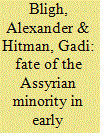

|
|
|
|
|
| Summary/Abstract |
Analyzing ethno-national conflicts is usually not easy in that not all quantitative scientific tools are useful to the student of a conflict based on primordial elements. The burden of studying the outcome of a conflict is all the more complex given that the two conflicting groups might be at two different stages of their political development at any given time during the course of the conflict. In the case of the fate of the [Eastern Christian] Assyrian community in early independent Iraq, the political rationale for decisions taken by each party was drawn from different sociological, historical and political realms. Decisions in times of conflict and their political and historical ramifications are not always rational, since they draw upon primordial/communal considerations rather than the accurate reading of the overall true strategic scene.
|
|
|
|
|
|
|
|
|
|
|
|
|
|
|
|
| 2 |
ID:
165218
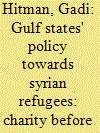

|
|
|
|
|
| Summary/Abstract |
The regional turmoil in the Middle East since December 2010 has provided researchers with many topics for research. Despite a relatively large number of studies in recent years, none of them deal with one of the central questions – namely, the attitude of the Gulf States toward the misery of the Syrian refugees. While more than six million Syrians fled their homeland and became refugees, 1.5 million in Europe, few, if any, succeeded in relocating to the Gulf States.
|
|
|
|
|
|
|
|
|
|
|
|
|
|
|
|
| 3 |
ID:
187431
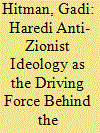

|
|
|
|
|
| Summary/Abstract |
Since its establishment as an independent state, Israel has witnessed waves of protests, sometimes violence, from the Haredi (ultraorthodox) community. Focusing on clashes between Haredi protesters and the police from 2000 onward, this study suggests a new theoretical explanation for Haredi protests and violent activities. By using a mixture of the following three major theories—primordial, constructivism, and contingency—the article provides a new model for analyzing Haredi patterns of confrontation with the Israeli authorities. It concludes, inter alia, that the Haredi community is a permanent passive protest movement that responds, usually immediately, to official initiatives to change the status quo involving the state, politics, society, and religion in Israel.
|
|
|
|
|
|
|
|
|
|
|
|
|
|
|
|
| 4 |
ID:
164327


|
|
|
|
|
| Summary/Abstract |
This article discusses the shift in Israel’s policy towards its Arab minority in 1990–2010 – from a security-based to a civil approach. This shift was reflected not only in increased resource allocation but also in the initiation of a dialogue with Arab politicians and public figures. Among the most prominent results of this policy change have been a reduction in socioeconomic gaps between Israel’s Jewish and Arab communities, a growing number of Arabs enlisting in national service, greater integration of Arabs in the civil service, and the approval of master plans for the development of all Arab settlements.
|
|
|
|
|
|
|
|
|
|
|
|
|
|
|
|
| 5 |
ID:
118384
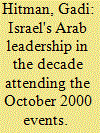

|
|
|
|
|
| Publication |
2013.
|
| Summary/Abstract |
This main thesis of this article is that while there is a general unanimity among Israel's Arab parties and/or organizations on national issues and the desired solution to the Palestinian problem, there are wide divergences in their positions on civil matters and the consequent need for a dialogue with the Israeli government and Jewish society. A governmental policy that encourages integration rather than exclusion can therefore minimize the tension between this sector and the state and neutralize potential sources of friction.
|
|
|
|
|
|
|
|
|
|
|
|
|
|
|
|
| 6 |
ID:
163901


|
|
|
|
|
| Summary/Abstract |
The non‐Jewish minority in Israel — Muslim Arabs, Christian Arabs, Druze, Circassians and Bedouins — has been a topic of ongoing research since the establishment of the Jewish state in 1948. The Arab sector is the largest in population. One of the key issues that concern scholars, and the Arabs themselves, is the political array within this minority.
|
|
|
|
|
|
|
|
|
|
|
|
|
|
|
|
| 7 |
ID:
193279


|
|
|
|
|
| Summary/Abstract |
This study seeks to understand what was behind the May 2021 violence of the Arab minority in Israel, particularly in mixed cities: was it national, religious or civic motives, or a combination of them? Historically, relations between Jews and non-Jews (mostly Muslims) in Israel circle around three axes: religious, national, and civic. While the fragile relations between the parties enjoy a quiet routine, a serious escalation is recorded from time-to-time, leading to a crisis between the parties. This was the case in May 2021, when an outbreak of severe Arab violence was recorded in mixed cities in Israel that resulted in three victims (two Jews, one Arab), dozens of injuries, and heavy damage to Jewish property. This qualitative research, based on interviews with Arab residents in mixed cities and media reports during the clashes and afterward, concludes that despite all three components having a significant contribution to May 2021 violent conflicts, civil affairs were the main reason for riots in mixed cities; however, the outbreak has a national and religious historical background.
|
|
|
|
|
|
|
|
|
|
|
|
|
|
|
|
| 8 |
ID:
171683
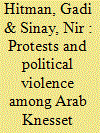

|
|
|
|
|
| Summary/Abstract |
This article seeks to understand the extent of Arab MKs’ involvement in protests and political violence over the past decade. By way of doing so, it will examine this phenomenon in four case studies: Mavi Marmara Flotilla (2010), Operation Pillar of cloud (2012), Operation Protective Edge (2014), and the passing of Israel’s Nation-State law in 2018. The findings reveal that, unlike many other protests in the Arab world, Arab Israeli protest in the examined case studies were neither based on economic inequality nor related to civil society issues but were rather a corollary of nationalist radicalisation. A dangerous trend of anti-Semitism was also detected among Israel’s Arab leaders.
|
|
|
|
|
|
|
|
|
|
|
|
|
|
|
|
| 9 |
ID:
177744


|
|
|
|
|
| Summary/Abstract |
This article seeks to analyse the political behaviour of the Arab sector in Israel in the three rounds of general elections held between April 2019 to March 2020. In the first round (April 9), despite high expectations within the Arab sector of seeing a joint Arab list competing in the elections for the 21st Knesset, the joint list was dismantled. Arab voters expressed their disappointment and stayed away from the ballot box. The political result was a decline from 13 to 10 parliamentary seats. In the second round (September 17) the joint list was reunited and won 13 seats again. In the third round (March 2020) it won 15 seats after competing yet again as a joint party. These experiences show that boycotting the elections harms the Arab minority while combining all political parties brings greater political influence.
|
|
|
|
|
|
|
|
|
|
|
|
|
|
|
|
|
|
|
|
|